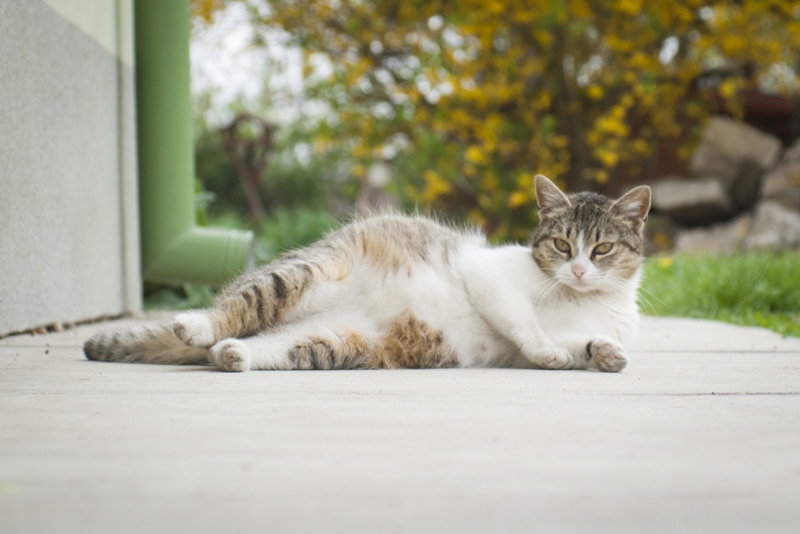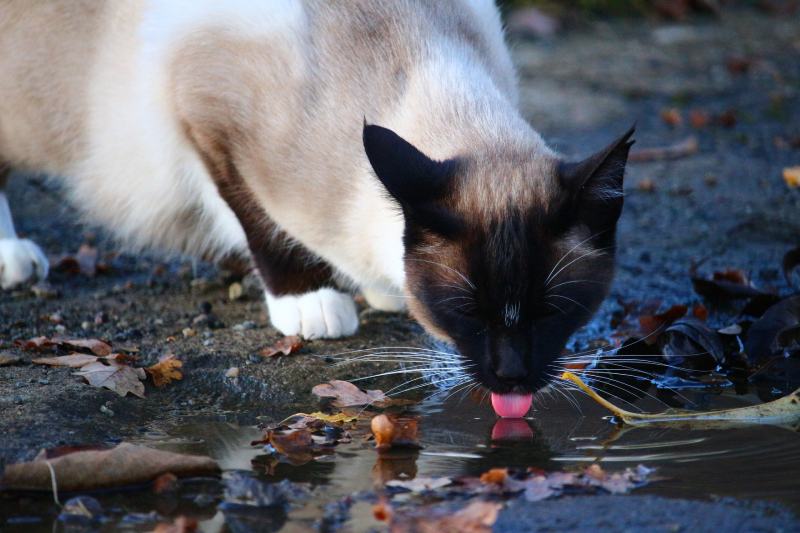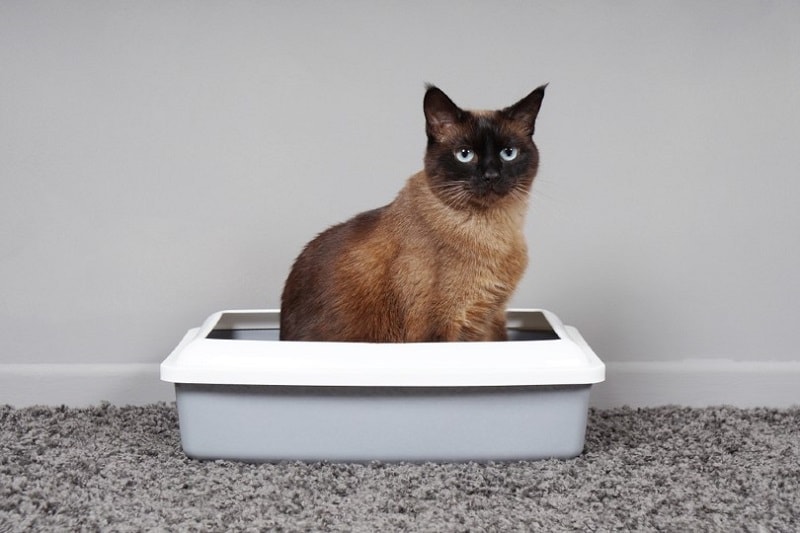Do Cats Get Morning Sickness When Pregnant? Vet-Approved Reasons, Tips, & Timeline
By Jordyn Alger
Updated on

Click to Skip Ahead
Around 4 weeks into your cat’s pregnancy, it is possible that she may experience morning sickness just like a human would. You may notice your cat displaying abdominal discomfort, such as vomiting and not eating. As distressing as this may be, it is a normal occurrence.
How can you help your cat manage her discomfort? What if you aren’t sure if your cat is pregnant? In this article, we will look at what you can expect during your cat’s pregnancy, as well as other reasons your pet may be nauseous.
How to Tell if Your Cat Is Pregnant
Early on in your cat’s pregnancy, it can be difficult to tell whether or not she is carrying kittens. The only way to tell for certain if she is pregnant is to consult your vet, but there are also some signs later in pregnancy that you may observe in your cat.

Weight Gain
One of the most obvious signs of pregnancy is weight gain. You can expect your cat to gain around 2–4 pounds during this 63 day time.
Change in Heat Cycle
Unspayed cats have a heat cycle that occurs around every 2-3 weeks. If you notice that your cat’s heat cycle has stopped, it is a good indication that she might be pregnant.
Increase in Appetite
Much like pregnant humans, pregnant cats have a greater appetite. She will need more food during this time to help fuel her body.
Swelling of the Abdomen
Your cat’s stomach will typically show signs of growing larger toward the middle of her pregnancy, or around 30 days after mating.
Affectionate Behavior
Some cat owners claim that their cats become more affectionate when pregnant. If you notice that your cat has been a bit more clingy than usual, it can be a sign of pregnancy–especially when combined with some of the other signs in this list.

How Your Vet Will Determine for Certain if Your Cat Is Pregnant
While all of the above signs are good indications of pregnancy, your vet has more precise ways of determining if your cat is pregnant. Your vet may be able to feel the babies as early as 20-30 days pregnant. Otherwise, they can use ultrasound around 3 weeks gestation or x-rays at around 40 days gestation to detect a pregnancy. Ultrasound and x-ray will also let you know how many kittens she is expecting. Similarly, vets can check for fetal heartbeats using a Doppler, but this is a less commonly used method.
How to Treat Your Cat’s Nausea
Sometimes morning sickness just has to run its course in pregnant cats. However, you may help her nausea by offering her smaller meals more frequently. Ensure that she has plenty of water and is maintaining hydration. Mild vomiting is expected, however, severe vomiting should be checked out by a vet, as there may be another reason for it. Also, severe vomiting that is causing dehydration or weight loss in your pregnant queen may require medications from your vet.
What to Expect During Your Cat’s Pregnancy
Feline pregnancy can be a challenging time, but thankfully, there is a predictable timeline.

Week One and Week Two
In the first two weeks, you probably won’t notice any changes in your cat. At this point, the fertilized eggs are implanting in the uterus, so your cat likely doesn’t even know she is pregnant.
Week Three
By week three, the fertilized eggs begin to grow. Your cat will experience a surge of hormones as a result, and you may notice some physical and behavioral changes. Your cat’s heat cycle should come to an end. You may also notice that her nipples start to enlarge and turn pinker.
Week Four
Week four is the time when your cat may begin to experience morning sickness. She may be uninterested in her regular food, so pay attention to how much she eats to ensure that she is fueling her body. You may also start noticing that her belly is becoming larger.
Week Five
During week five, your vet may be able to determine how many kittens your cat is carrying. You’ll continue to notice her belly swelling.

Week Six
Your cat should be very visibly pregnant at this stage. You may even spot kittens moving around now and then.
Your cat will also start to eat more often. She needs to consume a lot of nutrients to nurse her kittens, so ensure you are feeding your cat a healthy diet as determined by your vet.
Week Seven
When the seventh week of your cat’s pregnancy begins, she may begin nesting. This means she will be searching for a comfortable, secure location to give birth to her kittens. If you can create a warm, quiet, safe space for her with lots of blankets, she will likely give birth there. In addition to nesting, your cat may become more affectionate.
Week Eight
Your cat is getting closer to giving birth. Her nipples will become swollen, and she will groom herself much more.
Week Nine
During week nine, you may notice a little reddish discharge near your cat’s vulva. As alarming as it may seem, this is a normal part of the process and nothing to be worried about.
As the event of birth grows closer, your cat may be anxious. You may notice her pacing or spending a lot of time in her nesting area. Typically, your cat will give birth sometime around week nine.

Other Reasons Your Cat May Be Nauseous
While nausea may result from your cat’s pregnancy, there are many other reasons your cat may be experiencing gastrointestinal issues. If the nausea persists, reach out to your vet.
- Swapping her food too quickly
- Eating food that isn’t right for her
- Ingesting a toxin
- Ingesting a foreign object
- Constipation
- Food allergies
- Inflammatory bowel disease
- Hairballs
- Viral infections
- Intestinal parasites
- Cancer in the digestive tract
- Liver disease
- Pancreatitis
- Kidney disease
- Hyperthyroidism
- Uterine infection
- Diabetes mellitus
- Vertigo
- Brain tumors
- Motion sickness
This is not an exhaustive list of reasons your cat may experience nausea, so reach out to your vet if your cat continues to experience gastrointestinal distress. There is also a chance that certain medications could be causing stomach problems, but your vet can determine the cause of the distress.
Final Thoughts
Pregnant cats can experience morning sickness in addition to many other physical and behavioral signs. The more you know about feline pregnancy, the more you can help your cat. Stay in close contact with your vet so that you can provide the best care possible for your cat as you prepare to welcome new kitties into the world.
Featured Image Credit: C.L, Shutterstock












